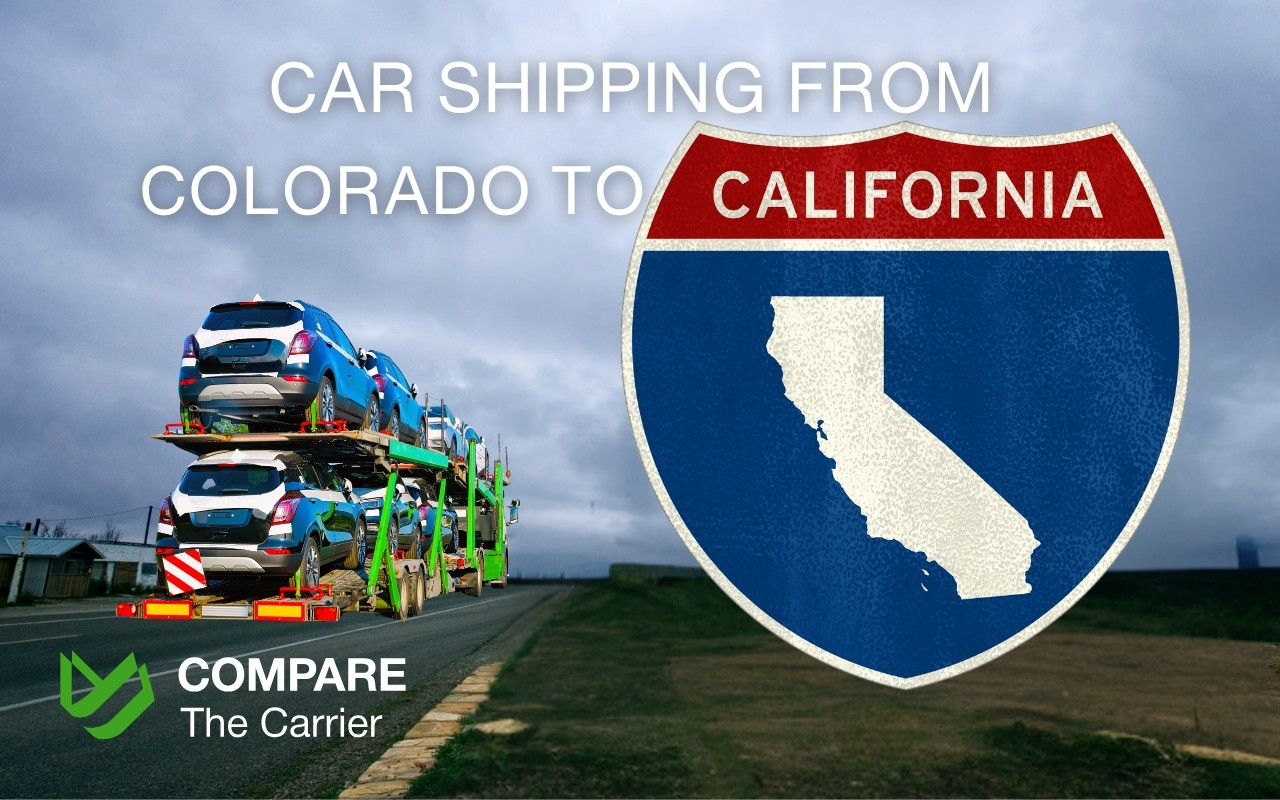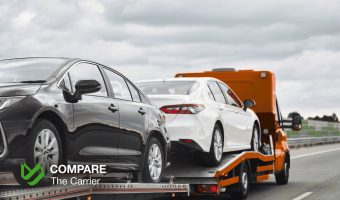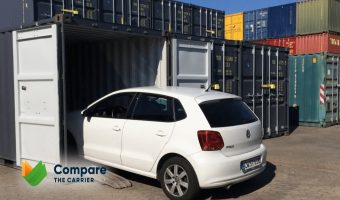Why Ship a Car from Colorado to California?
In 2026 alone, nearly 160,000 Californians moved in from other states — and Colorado was among the top 10 sources of inbound migration, according to U.S. Census Bureau migration trends. Whether it’s students heading to UCLA, families relocating for tech jobs in the Bay Area, or snowbirds escaping Colorado’s winters for SoCal sun, car transport between the two states is booming.
Add in the cost of fuel (averaging $4.37 per gallon in California as of May 2026, according to AAA fuel tracker) and the wear-and-tear risk of an 1,100+ mile road trip across desert, mountain, and coastal terrain, and it’s no wonder more Coloradans are choosing to ship instead of drive. Car shipping from Colorado to California offers a safer, smarter way to move your vehicle — whether it’s a compact commuter, a family SUV, or a vintage Mustang.
But the process isn’t always simple. Scams, hidden fees, and damaged vehicles can all derail an otherwise straightforward experience. That’s where CompareTheCarrier.com steps in — helping individuals and businesses connect with top-rated auto shipping services that are fully licensed, insured, and transparent.
In this in-depth guide, we’ll walk you through the entire Colorado to California vehicle transport journey. From understanding pricing and prepping your car, to choosing the right transport type and avoiding common pitfalls, this article is your go-to resource for cross-country car shipping Colorado to California.
How Auto Transport Works from Colorado to California
Organizing auto transport from Colorado to California is a lot more structured than most people think. It’s not a “book it and forget it” process — and when done right, it involves licensed carriers, verified logistics, and clear communication every step of the way. Here’s how the process works from the first quote to final delivery in California.
Step 1: Compare Verified Quotes
The first step in car shipping from Colorado to California is getting accurate, competitive quotes. Platforms like CompareTheCarrier.com simplify this by letting you compare prices from FMCSA-licensed, insured, and five-star reviewed transport companies in one place.
Each quote takes into account:
- Type of vehicle
- Pickup/delivery location (e.g., Denver to Los Angeles or Colorado Springs to San Diego)
- Type of transport (open vs enclosed)
- Seasonal demand
- Your delivery timeframe
Insider Tip: Always verify that the transporter has a valid USDOT and MC number via the FMCSA Safety and Fitness Electronic Records system.
Step 2: Choose the Right Carrier or Broker
Once you compare options, you’ll choose either a carrier (the company physically transporting your vehicle) or a broker (the intermediary who connects you with a carrier — more on that in the next section).
You’ll finalize a contract that outlines:
- Estimated pickup and drop-off windows
- Transport type and insurance coverage
- Payment terms (many use a deposit + cash on delivery model)
Step 3: Vehicle Inspection and Pickup
Before loading, the driver will conduct a pre-shipment inspection of your car. You’ll both document its current condition on a Bill of Lading (BOL), which you’ll later use to verify delivery condition.
- Take your own photos of the vehicle (inside and out)
- Remove personal items (most carriers won’t cover items left inside)
- Leave about ¼ tank of gas
Your vehicle is then carefully loaded onto the carrier — either an open-air trailer or enclosed rig — and begins the journey from CO to CA.
Step 4: In Transit — Cross-Country Journey
Most cross-country car transports from Colorado to California cover 1,100 to 1,300 miles, depending on starting and ending points. The average transit time is 5 to 8 days, depending on factors like:
- Distance and route traffic
- Weather delays (think winter storms in the Rockies)
- Number of vehicles on the load
- Delivery speed (standard vs expedited)
Many top-rated auto shipping companies offer GPS tracking or regular status updates so you’re not left wondering where your vehicle is.
Step 5: Delivery and Final Inspection
Once the car arrives in California, the driver will perform a final inspection to ensure the vehicle matches the condition documented at pickup. You (or your authorized representative) will:
- Inspect the vehicle carefully
- Compare it to the BOL
- Sign off on the delivery
- Pay any remaining balance if applicable
Real Example: “I shipped my Subaru Outback from Fort Collins to San Jose through CompareTheCarrier. The driver called a day ahead, met me at a grocery store parking lot, and the car arrived spotless in six days. Would use again.” — Haley L., Verified CustomerWhether you’re a student moving to UC Berkeley, a retiree headed to San Diego, or a dealer transporting inventory to Los Angeles, Colorado to California car shipping is smoother when you understand how the process works — and when you choose a trusted auto transporter through CompareTheCarrier.

Broker vs Carrier: What’s Better for Colorado to California Shipping?
When setting up car shipping from Colorado to California, one of the most important decisions you’ll face is whether to work with a carrier or a broker. While both can successfully get your vehicle from CO to CA, how they operate — and what that means for your cost, control, and experience — varies significantly.
Let’s break it down.
What Is a Carrier?
A carrier is the actual transport company that owns the trucks and trailers. They’re the ones who physically load, haul, and deliver your vehicle.
Pros of Working Directly with a Carrier:
- Direct communication with the person responsible for your car
- Potentially fewer fees (no middleman markup)
- May offer more personalized service if it’s a small or local fleet
Cons:
- Limited fleet availability (especially for long-distance or rural routes)
- May not be available when you need them
- You’ll need to vet them yourself for FMCSA compliance, insurance, and reviews
Example: You may find a local hauler in Pueblo who runs weekly trips to LA. That’s great — if your dates align. If not, you’re stuck waiting or calling around.
What Is a Broker?
A broker is a logistics specialist who connects customers with carriers. They don’t own the trucks but use their network to find a reliable, available transporter that meets your schedule and price point.
CompareTheCarrier.com acts as a modern broker — but better. It provides side-by-side quotes from top-rated auto shipping companies, filters out low-quality providers, and gives you the power to choose with confidence.
Pros of Using a Broker (Especially via CompareTheCarrier):
- Access to a nationwide carrier network
- Faster pickups and better pricing due to competition
- Brokers handle all paperwork, coordination, and vetting
- Ideal for first-time shippers or cross-country moves
Cons:
- Some brokers (not all) may be less transparent if you’re not using a trusted platform
- Less control over which exact driver gets assigned (though you’ll still get all carrier details before transport)
When Does a Broker Make More Sense?
For auto transport from Colorado to California, a broker is usually the smarter choice — especially if:
- You’re shipping long-distance (e.g., Denver to San Diego or Aspen to Sacramento)
- You need flexibility on pickup dates
- You want multiple quotes to compare price and reputation
- You’re new to auto transport and want expert support
Customer Case: “We were relocating from Boulder to Santa Barbara. I didn’t have time to call 10 companies, so we used CompareTheCarrier. Found a carrier with over 2,000 moves and a 4.9-star rating — easy choice.” — Brad & Eliza T., Family Relocation
Final Verdict: Broker vs Carrier
| Feature | Carrier | Broker (via CompareTheCarrier) |
| Scheduling Flexibility | Limited availability | High flexibility, faster pickups |
| Pricing | May be lower, but fewer options | Competitive rates from multiple carriers |
| Customer Support | Varies by company | Full support team + live help |
| Risk of Scams | Must vet the company yourself | All carriers verified through FMCSA and BBB |
| Best For | Local moves, known carriers | Long-distance, cross-country, first-time shippers |
In short, brokers — particularly those working through platforms like CompareTheCarrier — provide the flexibility, transparency, and efficiency most customers need for Colorado to California vehicle transport.

Car Shipping Cost from Colorado to California
When budgeting for car shipping from Colorado to California, knowing what to expect cost-wise can save you from surprises — and help you avoid being overcharged or under-served. While there’s no one-size-fits-all price tag, we can break down typical costs, key variables, and how to get the best value for your auto transport.
Average Cost to Ship a Car from Colorado to California
As of 2026, the average Colorado to California car shipping cost falls between $900 and $1,400 for standard vehicles using open transport. Prices rise for enclosed shipping or expedited services.
| Transport Type | Estimated Price Range | Transit Time |
| Open Carrier (Standard) | $900 – $1,300 | 5–8 days |
| Enclosed Carrier | $1,300 – $1,800+ | 5–8 days |
| Expedited Service | $1,500 – $2,200+ | 2–4 days |
These estimates apply to major routes like Denver to Los Angeles or Colorado Springs to San Diego. More rural pickups or drop-offs — such as Grand Junction to Monterey — may increase cost due to limited carrier availability and additional mileage.
Real-World Examples
“We paid $1,050 to ship our Honda CR-V from Boulder to Sacramento using an open carrier we found through CompareTheCarrier. We got three quotes, picked one with great customer reviews, and everything was right on time.” — Kelly R., Verified Customer
“Used enclosed transport for my 1973 Corvette from Aspen to San Jose. Cost me $1,750, but the service and protection were worth it.” — Marcus L., Car Collector
How to Get an Accurate Quote
Every vehicle and route is a little different. For the most precise pricing:
- Know your exact pickup and delivery addresses
- Be clear about your vehicle’s condition (operable or not)
- Choose between open or enclosed transport
- Specify if you need expedited or flexible delivery dates
The best way to compare is by using CompareTheCarrier’s free quote tool — it pulls real-time pricing from licensed carriers who are ready to bid on your shipment.
What’s Included in the Price?
Most base quotes for California car delivery from Colorado include:
- Door-to-door pickup and drop-off
- Basic insurance coverage (confirm the amount)
- Fuel and toll costs
- Vehicle loading/unloading
Always confirm whether there are any additional charges, such as:
- Non-running vehicle fees
- Oversize vehicle surcharges
- Remote or hard-to-access delivery fees
Final Thoughts on Pricing
Don’t be tempted by the lowest quote — it may come from a broker cutting corners with unvetted carriers. Instead, aim for:
- Clear terms and support
- Transparent pricing
- Five-star reviews
- Verified FMCSA and BBB status
- Clear terms and support
Key Factors That Influence the Cost of Shipping from Colorado to California
While average pricing offers a starting point, the actual Colorado to California car shipping cost depends on several variables. Understanding these factors helps you make smarter choices, avoid unnecessary fees, and optimize for budget or speed — depending on your priorities.
1. Type of Transport: Open vs. Enclosed
This is the single biggest pricing factor.
- Open transport is the most popular and economical option — typically 30–40% cheaper than enclosed shipping.
- Enclosed transport offers full protection from weather, dust, and road debris. It’s the preferred option for luxury, exotic, or antique vehicles.
| Open Carrier | Great for everyday vehicles, lower cost |
| Enclosed Carrier | Ideal for high-value or collector cars, more secure |
Example: Shipping a Ford Escape from Denver to Los Angeles via open carrier may cost ~$1,000, while the same route in an enclosed trailer could run $1,500+.
2. Vehicle Size, Weight & Condition
Bigger vehicles = higher cost. Transport companies factor in how much space and weight your car adds to the trailer.
- Compact cars (e.g., Civic, Corolla): lowest cost
- SUVs, trucks, minivans: +$100–$300 extra
- Non-operational vehicles: Often require winching or forklift use — expect an additional $100–$200
Make sure to disclose modifications like lift kits or oversized tires — these affect carrier selection and pricing.
3. Season and Demand
Transport demand between Colorado and California fluctuates throughout the year:
- Winter (Dec–Feb): Increased rates due to snowbird relocations
- Spring/Fall: Often the most affordable and flexible times to ship
- Summer (May–Aug): Higher demand from students and families moving west = higher prices
According to FMCSA reports, carrier availability tends to be most limited in late December and early July, so booking ahead is essential during peak times.
4. Pickup and Delivery Locations
Shipping from metro areas like Denver, Colorado Springs, or Fort Collins to large California hubs (Los Angeles, San Diego, San Francisco) is more affordable due to:
- Easier access for large transport trucks
- Higher carrier volume and route overlap
However, if you’re shipping from or to a remote area — say, Telluride or Big Sur — you’ll likely pay more. Rural pickups may require:
- Extra mileage charges
- Longer delivery windows
- Meeting the driver at a nearby accessible location
5. Expedited vs. Standard Shipping
If you’re in a hurry, fast and safe delivery is available — at a price. Expedited services guarantee quicker pickup and reduced transit time (as little as 2–3 days), but they typically cost 20–50% more than standard delivery.
Use this option if:
- You’re on a tight relocation timeline
- You need a guaranteed drop-off window
- You’re transporting a high-value vehicle that needs extra care
6. Insurance and Coverage
Most trusted auto transporters include basic cargo insurance — usually $250,000–$1 million depending on the carrier and type of trailer. But:
- Not all policies cover every type of damage
- Deductibles and exclusions may apply
- You may want to purchase supplemental coverage, especially for high-value vehicles
Be sure to ask:
- What is the policy limit?
- Are personal items inside the car covered? (Usually not)
- How are claims handled?
7. Market Rates and Fuel Prices
The cost of diesel fuel (hovering around $4.10/gallon in Western states as of May 2026 — source:AAA) has a direct impact on transport pricing. High fuel costs, road tolls, and changing regulatory fees can all affect what a carrier charges.
Platforms like CompareTheCarrier track these variables in real time to ensure quotes reflect current market conditions.
Understanding these factors allows you to prioritize what matters most — whether it’s budget, protection, or speed — and choose the best car shipping company that aligns with your needs.
Step-by-Step Guide to Getting Your Car Ready for Cross-Country Shipping
Preparing your vehicle properly is one of the most important — and often overlooked — parts of the car shipping from Colorado to California process. A few smart steps can prevent misunderstandings, damage claims, and last-minute delays. Whether you’re shipping a daily driver, a family SUV, or a classic car, here’s exactly how to get ready for a safe and stress-free transport from CO to CA.
Step 1: Wash Your Vehicle and Document Its Condition
Clean your car thoroughly, inside and out. A clean vehicle makes it easier to inspect for dings, scratches, or other pre-existing issues.
- Wash and dry the exterior
- Remove mud and snow from wheel wells and undercarriage (especially in winter months)
- Take clear, timestamped photos from all angles, including close-ups of any damage
- Photograph the odometer and note the mileage
These records can be crucial in case of a damage claim after Colorado to California vehicle transport.
Step 2: Remove Personal Items and Valuables
Federal law prohibits auto transporters from shipping personal belongings inside vehicles, and most insurance policies do not cover them.
Remove:
- Electronics (chargers, GPS devices, dash cams)
- EZ-Pass or toll tags (to avoid false charges)
- Important documents or paperwork
- Anything loose in the trunk or cabin
Some trusted auto transporters may allow up to 100 lbs of personal items in the trunk, but it must be disclosed in advance and is carried at your own risk.
Step 3: Perform Basic Maintenance Checks
Even though your car isn’t being driven cross-country, it still needs to be in operable condition (unless you’ve arranged non-op transport).
Check the following:
- Battery is fully charged
- Tires are properly inflated
- Fluid levels (oil, coolant, brake, transmission) are topped off
- Leaks are identified and fixed
- Brakes are functioning properly
If your car is not running, let the carrier know ahead of time — not all companies are equipped to handle non-operational vehicles, and it will affect your Colorado to California car shipping cost.
Step 4: Disable Alarms and Security Features
If your car alarm goes off during transport, the driver can’t always stop and reset it. Prevent issues by:
- Disabling all alarms before pickup
- Providing written instructions or a remote if necessary
- Locking the vehicle once it’s loaded (drivers don’t need access to the interior during transit)
Step 5: Reduce Fuel to 1/4 Tank
You don’t need a full tank — your vehicle will only be driven on and off the trailer.
- Aim for no more than 1/4 tank of gas
- A lighter vehicle is easier and safer to transport
- Full tanks can increase the risk of fuel leaks and add weight, which can affect cost
Step 6: Prepare Keys and Documentation
You’ll need to provide:
- A full set of keys (ignition, doors, trunk)
- Wheel lock key if applicable
- A printed or digital copy of the Bill of Lading (the contract/inventory report used during pickup and delivery)
- Proof of ID if required by the carrier
Pro Tip: Never leave your original vehicle title or registration in the car. These are not needed for domestic transport.
Step 7: Coordinate the Pickup Location
Many Colorado neighborhoods — especially in mountain or suburban areas — may have tight roads or HOA restrictions that make it tough for a transport trailer to access your home.
Work with your driver to:
- Provide gate codes or detailed directions if needed
- Arrange a meeting spot (e.g., nearby parking lot or shopping center) if your street is inaccessible
- Ensure someone 18+ is available at both pickup and delivery to sign paperwork and inspect the vehicle
Real Example: “Our street in Lakewood had low-hanging trees. The driver called ahead and met me at a local Walgreens — super easy, and we were done in 20 minutes.” — Jacob P., Denver to San Diego shipment
Taking the time to prep your vehicle shows the transporter you’re serious — and helps ensure your car arrives in California just as it left Colorado.

Choosing Between Open or Enclosed Car Transport for a Colorado to California Move
When booking car shipping from Colorado to California, one of the most important decisions you’ll make is choosing between open and enclosed transport. Each method has its advantages, depending on your vehicle type, value, and personal priorities. Understanding the difference will help you select the right level of protection for your car — and the right price point for your budget.
Open Car Transport — The Most Common and Cost-Effective Option
Open carriers are the standard in the auto transport industry. These trailers typically haul 7–10 vehicles at once and are the most widely available option for cross-country car shipping Colorado to California.
Pros:
- Lower cost: 30–40% cheaper than enclosed transport
- Wider availability: More trucks = more flexible scheduling
- Faster pickup times: Ideal for last-minute or standard delivery needs
- Great for most vehicles: Daily drivers, SUVs, sedans, and crossovers
Cons:
- Vehicle is exposed to the elements — including rain, dust, and road debris
- Higher risk of minor cosmetic damage (though still rare)
Real Case: “Shipped my 2021 RAV4 from Aurora to Sacramento for $1,050 using open transport. Easy process and the car arrived a day early with no issues.” — Dana M., Verified Customer
Enclosed Car Transport — Premium Protection for High-Value Vehicles
Enclosed carriers transport fewer vehicles (typically 2–5) and provide full coverage from weather and debris. This method is ideal if you’re shipping a car that’s valuable, rare, or has sentimental importance.
Pros:
- Maximum protection from weather, dirt, and debris
- Often includes higher insurance coverage
- Drivers tend to be more experienced with exotic or collectible cars
- Peace of mind for owners of rare or luxury vehicles
Cons:
- Higher cost: Often $300–$800 more than open transport
- Less availability = potentially longer lead time
Example: A classic car owner in Colorado Springs paid $1,600 to transport a restored 1967 Mustang in an enclosed trailer to Long Beach — with white-glove handling and full insurance included.
How to Choose the Right Transport Type
| Factor | Choose Open If… | Choose Enclosed If… |
| Vehicle Type | It’s a standard, modern car | It’s luxury, classic, exotic, or has high sentimental value |
| Budget | You’re price-conscious | You’re willing to pay more for protection |
| Time Flexibility | You want quicker availability | You can wait for the right enclosed slot |
| Weather Concerns | You’re shipping in good weather months | You’re concerned about winter storms or harsh conditions |
| Insurance Needs | Basic liability coverage is sufficient | You want enhanced coverage with higher policy limits |
Still Not Sure?
When you use CompareTheCarrier.com, you can request both open and enclosed shipping quotes side by side. This makes it easier to weigh the price difference against peace of mind, especially for longer transports from Colorado to California.
And if you’re unsure whether your car needs enclosed transport, our experts are here to help — just use the live chat or call customer support to get personalized recommendations from professionals who’ve seen it all.
What to Expect on Delivery Day in California
The journey’s almost over — and car shipping from Colorado to California officially ends when your vehicle is safely unloaded and handed back to you. But delivery day isn’t just a handoff — it’s your final checkpoint to ensure everything went as expected. Whether you’re meeting your car in Los Angeles, San Diego, San Jose, or somewhere off the beaten path, here’s what to expect (and how to prepare).
1. Pre-Delivery Contact from the Carrier
Most professional auto transporters will call 12 to 24 hours before arriving to:
- Confirm the delivery address
- Set an estimated time window
- Arrange a safe meeting location if your home isn’t accessible for a large trailer
If your delivery address is in a tight or restricted area (downtown SF, steep hills, gated communities), the driver may request to meet at a nearby parking lot or open area.
Pro Tip: Stay reachable via phone and have a backup contact listed, just in case.
2. Final Vehicle Inspection
Just like at pickup, a post-delivery inspection is required. The carrier and you (or your representative) will:
- Compare the vehicle’s current condition to the Bill of Lading (BOL)
- Review your pre-shipping photos, if needed
- Note any new damage (scratches, dents, tire issues) on the BOL
- Sign off once everything is confirmed
If you notice any damage:
- Document it with photos
- Make sure it’s written on the BOL before signing
- Begin the insurance claim process through the carrier’s coverage
Real Review: “Our Camry was delivered to Burbank and looked perfect. The driver walked us through the paperwork and even helped us check under the hood. Great customer support from start to finish.” — Henry S., Colorado Springs to LA
3. Final Payment (If Applicable)
Depending on the terms you agreed to when booking:
- You may have already paid in full at booking
- Or you may owe the remaining balance at delivery (typically in cash, certified check, or Zelle/Venmo, depending on the carrier)
Be sure to:
- Have payment ready if needed
- Ask for a receipt or payment confirmation
4. Quick Post-Delivery Checks
Before driving off, take a few minutes to:
- Start the engine and let it run
- Check tires, brakes, and fluid levels
- Reinstall any items you removed (toll tags, floor mats, child seats)
- Unlock and inspect the trunk, hood, and undercarriage
If your car was in transit for more than a week, it’s smart to give it a quick tune-up or wash, especially after cross-country car shipping from Colorado to California.
5. Final Documentation
Make sure you leave with:
- A signed copy of the Bill of Lading
- Any notes or documentation about the vehicle’s condition
- Payment records, if applicable
- Contact info for your carrier or broker, just in case questions come up later
What If You Can’t Be There?
No problem — just assign a trusted representative (family member, friend, neighbor) to:
- Meet the carrier
- Conduct the inspection
- Sign the BOL
- Make payment (if necessary)
Be sure to notify the transporter in advance and give your rep copies of all relevant documents.
Delivery day is your last chance to confirm your car was handled properly — and with trusted auto transporters, it should feel like a final box checked, not a stressful surprise.
Why Compare The Carrier Makes Colorado to California Shipping Smarter and Safer
With so many options for auto transport from Colorado to California, it’s easy to feel overwhelmed — or worse, fall into the trap of choosing a low-cost provider that cuts corners. That’s exactly why Compare The Carrier exists: to bring transparency, safety, and simplicity to a process that’s too often opaque or risky.
Let’s break down how Compare The Carrier helps you make smarter, safer decisions when shipping from CO to CA.
Instant Access to Licensed, Vetted Carriers
Every transporter listed on CompareTheCarrier is:
- FMCSA-licensed and fully insured
- Background-checked for safety and delivery history
- Rated by real customers who’ve shipped their vehicles coast-to-coast
According to FMCSA, one of the biggest risks in the transport industry is dealing with unlicensed or underinsured companies. CompareTheCarrier eliminates this risk entirely by only listing verified and compliant carriers.
Transparent Quotes — No Guesswork, No Bait-and-Switch
We’ve all heard the horror stories: a low initial quote that suddenly skyrockets at pickup. With CompareTheCarrier, what you see is what you get:
- Real, upfront pricing with clear breakdowns
- Multiple quotes from top-rated auto shipping providers so you can compare in seconds
- Clear options for open vs. enclosed, standard vs. expedited
Real User Insight: “Other sites were vague or misleading. CompareTheCarrier gave me five quotes instantly — all from rated companies with hundreds of real reviews. It made the choice easy.” — Anita M., Denver to San Diego move
Tools Designed for All Types of Shippers
Whether you’re:
- A snowbird relocating for winter
- A student moving into college housing
- A family relocating for work
- A car dealer managing inventory between states
- Or just someone buying/selling a car online
CompareTheCarrier helps you:
- Match with the best car shipping company for your needs
- Filter by delivery speed, transport type, or rating
- Use our free quote calculator to get market-accurate pricing in minutes
Real Reviews, Real Ratings, Real Results
Each listing includes:
- Verified customer reviews
- Star ratings based on delivery success, communication, and pricing accuracy
- Details on transport volume, specialty services (e.g., luxury or military moves), and support history
This means you don’t have to roll the dice — you can see exactly how a carrier performs, before you commit.
U.S.-Based Support from Auto Transport Experts
Questions about insurance? Want help choosing between open and enclosed? Concerned about rural pickup? Our real, human customer support team is here to help — not a bot, not an outsourced call center.
You’ll get:
- Friendly, knowledgeable help by phone or live chat
- Assistance with paperwork and scheduling
- Follow-up support if anything goes wrong
Safer Shipping Starts with Smarter Choices
CompareTheCarrier is built for one purpose: to help people ship their cars from Colorado to California with less stress and more confidence. You don’t have to guess, gamble, or get gouged.Whether you’re relocating permanently or just escaping Colorado’s winter for the West Coast, we help you connect with the most trusted auto transporters, save money, and ensure your vehicle gets to California — safe, sound, and on time.
Colorado to California Car Shipping — Done Right
Shipping your car from Colorado to California doesn’t have to be complicated or stressful. With the right preparation, trusted partners, and a clear understanding of the process, you can enjoy a smooth, efficient, and affordable experience — whether you’re a student, family, car buyer, dealer, or seasonal traveler.
Here’s what we’ve covered:
The Process — From Pickup to Delivery
You now know the entire lifecycle of auto transport from Colorado to California:
- How to request quotes and choose a broker or carrier
- What to expect at pickup and drop-off
- How long it takes and how much it typically costs
- The pros and cons of open vs. enclosed transport
The Pricing — What Impacts Your Quote
The Colorado to California car shipping cost is shaped by:
- Transport type (open or enclosed)
- Vehicle size, condition, and location
- Time of year and delivery speed
- Insurance requirements and carrier availability
By understanding these variables, you can request smarter quotes, spot red flags, and lock in a fair rate without sacrificing safety or service.
The Tools — Your Competitive Advantage
With CompareTheCarrier.com, you can:
- Compare quotes from licensed, top-rated auto shipping companies
- Filter by transport type, timing, and customer reviews
- Get live support from shipping experts with years of industry knowledge
- Use our free price comparison calculator to make decisions based on facts — not guesswork
The Confidence to Ship — Without Regrets
Thousands of vehicle owners trust CompareTheCarrier every year to handle their cross-country car shipping from Colorado to California. Why? Because we:
- Remove the risk of scams and shady carriers
- Provide five-star reviewed, FMCSA-vetted options only
- Offer real transparency and support, not just a quote and a goodbye
From the snowy streets of Denver to the sun-kissed highways of LA, we help get your car there safely, quickly, and affordably — every time.
Ready to Ship?
Start now by requesting your free quote or try the CompareTheCarrier price comparison tool. It only takes 60 seconds — and it could save you hundreds.
FAQ
To wrap up, here are the most frequently asked — and most important — questions about car shipping from Colorado to California. These detailed answers will help you ship smarter, avoid surprises, and get the peace of mind you need for a successful coast-to-coast vehicle transport.
How long does it take to ship a car from Colorado to California?
Standard delivery takes 5 to 8 days, depending on distance, weather, and traffic. Routes like Denver to Los Angeles are typically on the shorter side, while remote areas may add a day or two.
Expedited shipping can shorten this to 2–4 days, but at a higher cost.
Pickup usually happens within 1 to 4 business days after booking.
Pro Tip: Book early and be flexible on dates to get faster service at a better rate.
What’s the average cost to ship a car from CO to CA?
The average Colorado to California car shipping cost is between $900 and $1,400 for standard open transport. Here’s a quick breakdown:
Open carrier: $900 – $1,300
Enclosed carrier: $1,300 – $1,800+
Expedited service: $1,500 – $2,200+
Your final price will vary based on vehicle type, location, timing, and service level.
Is my car insured during transport?
Yes — all FMCSA-licensed carriers are required to carry cargo insurance, typically ranging from $250,000 to $1 million. However:
Always verify the coverage limits and what’s included
Personal items inside the vehicle are not covered
You may want to purchase supplemental insurance for high-value vehicles
Use CompareTheCarrier to view verified insurance information for every transporter.
Should I use open or enclosed transport?
Open transport is best for most standard vehicles and offers the lowest cost.
Enclosed transport provides full protection and is ideal for luxury, classic, or exotic cars.
If you’re shipping a valuable or rare vehicle — or you’re worried about road debris or weather — enclosed is worth the extra investment.
Can I put personal items in my car during shipping?
Some carriers allow up to 100 lbs of personal items in the trunk or cargo area, but:
It must be disclosed at booking
Items are not insured
The interior should remain clean and uncluttered
Never leave: electronics, documents, valuables, tools, or anything irreplaceable in the car.
Do I need to be present at pickup and delivery?
Yes — either you or a designated representative must be present to:
Sign the Bill of Lading (BOL)
Perform vehicle inspections at both ends
Settle any remaining balance if required
You can assign a friend or family member if you’re unavailable — just give the transporter advance notice and proper authorization.
How do I avoid scams or unreliable carriers?
Use platforms like CompareTheCarrier that pre-screen every transporter for FMCSA licensing and customer satisfaction.
Avoid companies with no DOT/MC number or vague pricing
Don’t pay full price upfront — legitimate brokers and carriers use deposits or split-payment models.
Bonus: CompareTheCarrier only works with rated, insured, and vetted professionals — removing the guesswork from your search.
What documents are required to ship a car?
You typically need:
A valid government-issued ID
The vehicle’s make, model, and VIN
Signed Bill of Lading
Proof of ownership is not required for domestic transport
How do I get started?
Visit CompareTheCarrier.com, enter your pickup and delivery details, and receive free quotes from trusted auto transporters within minutes.
From there, you can:
Compare prices
Choose open or enclosed transport
Book your shipment with full visibility and expert support

















